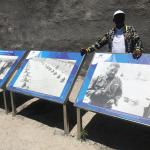Support
My name is Luiz Gomez and I am a senior Global Studies major. After my semester-long experienced in Kenya, I was fortunate to receive a Travel Grant to visit Cape Town South Africa. My interest in wanting to visit South Africa had in large part to do with my interest in the system of Apartheid which in many ways mirrors the history of America’s own racial Apartheid, the focus of my Honor Senior Thesis. I originally turned my sights to the South African Apartheid system after reading Trevor Noah’s biography “Born a Crime” in which discusses his upbringing as a mixed-race child within the Apartheid regime and how the architects of apartheid studied systematized forms of oppression from societies all over the world to create what he called “perfect racism”. It took only a few days of speaking with locals, tour guides and taxi drivers to glean that unlike in America, there seemed to exist a general atmosphere of acknowledgement of the “Crimes of the past” and thus I found many opportunities to hear those stories told and retold.
Specifically, through what were generally immersive museum experiences. What was most impactful about those experiences was that the exhibit guides were usually people who lived through the events being explained and can speak to firsthand accounts, making what they had to say all the more chilling. At the district six museum, which represents a previously predominantly black community in the heart of the city that was bulldozed to make way for an “All white community”, I was guided by a woman named Farrakhan. Farrakhan lived in district six as a child and told stories about how people fought to retain their livelihoods, only to fall victims to mass violence at the hands of white vigilantes which had the backing of the state. Farrakhan turned to the photos of the “old district six” and pointed to her childhood home. In another she turned and pointed it out among the pile of rubble that became of the entire neighborhood. In another, it is depicted, converted into a luxury condominium. At the very end of the tour she said “in every region of the country you will find multitudes of district sixes”, depicting it as merely a microcosm for the realities of racial apartheid and post colonialism.
On another instance, I visited Robin Island, the Island prison that Nelson Mandela was incarcerated in before the “fall of Apartheid.” Our tour guide Simon, was formerly Incarcerated at Robin Island at the same time as Mandela. As we are taken around the Island, Simon show’s us where prisoners were taken to work on mines, where conditions were gruesome. He told us that bathroom trips while at the mines usually provided prisoners with their chance at evading the gaze of the guards. This he says, was often how Mandela and his associates discussed political activity. Mandela’s story, as evident in the Robin Island gift shop, is told and retold as the country’s great national myth. I learned about leaders like Mandela (or Gandhi who is also personally implicated) and how mythology around their struggles which were really aimed at equality for some and not for all, prevents from gauging the history in its entirety and disarms arguments that those forces are still rampant. It is my hope to use this experience to enrich my perspective and understanding of how systems of power are globally interconnected.
